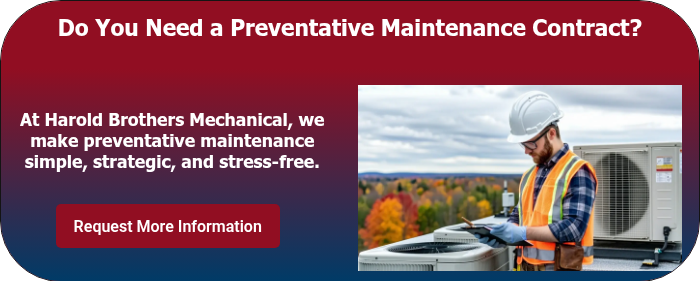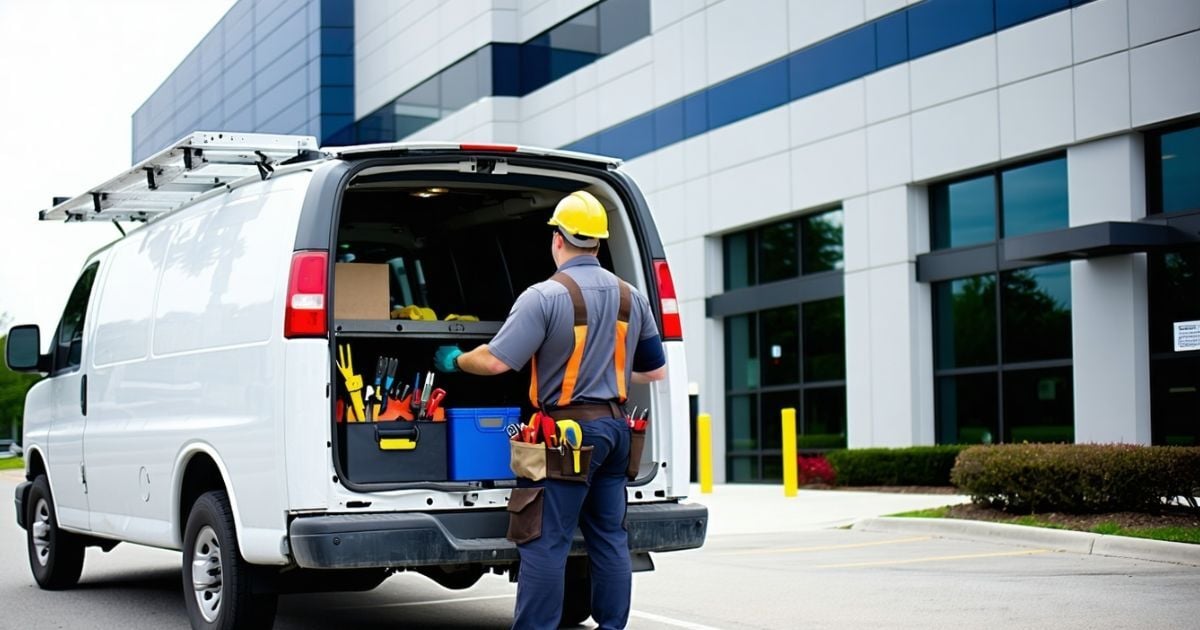7 Fall Commercial HVAC Maintenance Tasks For Facilities Managers
August 18th, 2025
4 min read
By Lisa Flynn

If you're responsible for managing a commercial or industrial building in Massachusetts, you know how fast winter weather can turn into a crisis. All it takes is one cold snap to expose a system that wasn’t properly shut down or tuned up in the fall, leading to emergency service calls, tenant complaints, or even system-wide failures.
At Harold Brothers, we’ve spent 17+ years helping facilities across New England prepare for the heating season. From hospitals and schools to manufacturing plants and office buildings, our team knows how to keep critical HVAC systems running reliably when the temperature drops.
In this article, we’ll walk you through the 7 essential HVAC maintenance tasks every facility should complete before winter and why skipping even one could cost you thousands in repairs or lost productivity.
1. How Do I Shut Down My Commercial HVAC Cooling Equipment for Winter?
Before winter hits, properly shutting down your building’s cooling system is a key step in any fall HVAC checklist. This protects your investment, prevents unnecessary wear, and ensures your system is ready for spring startup without costly surprises.
Basic Tasks:
- Power down condenser units that are cooling-only; if they’re part of a heat pump system, they remain operational year-round
- Shut down and drain cooling towers to prevent freezing and corrosion
- Remove debris like leaves, branches, or dirt
- Check for visible damage, such as cracked panels
More Complex Tasks:
- Inspect refrigerant lines for leaks or signs of wear
- Check all wiring and control settings
- Test system performance before the final shutdown
Why it Matters:
A proper seasonal shutdown is like storing your summer equipment the right way. You want it clean, dry, and protected so it is ready in the spring. If the system includes refrigerant or automation controls, overlooking shutdown steps can lead to costly problems down the line.
2. How Often Should I Replace Air Filters in My Commercial HVAC System?
%20-%202025-12-11T075606.910.jpg?width=355&height=473&name=Untitled%20(768%20x%201024%20px)%20-%202025-12-11T075606.910.jpg) Swapping out old air filters is one of the fastest, most cost-effective ways to improve HVAC efficiency and indoor air quality in commercial spaces. In Massachusetts, where seasonal changes put systems to the test, clean filters keep airflow steady and reduce strain on equipment.
Swapping out old air filters is one of the fastest, most cost-effective ways to improve HVAC efficiency and indoor air quality in commercial spaces. In Massachusetts, where seasonal changes put systems to the test, clean filters keep airflow steady and reduce strain on equipment.
Basic Tasks:
- Replace filters in rooftop or air handling units
- Match filters to your building’s required MERV rating
More Complex Tasks:
- Measure airflow and pressure drop across filters
- Access filters in hard-to-reach or sealed systems
- Maintain HEPA or specialized filtration systems
Why it Matters:
Changing filters is like changing the oil in your car. If you skip it, your system works harder, becomes less efficient, and is more prone to failure. In many buildings, filter maintenance also supports air balancing and compliance standards that require professional oversight.
3. How Do I Clean Air Registers and Grilles in a Commercial Building?
Dusty or blocked vents can reduce comfort, increase energy costs, and negatively impact indoor air quality. A quick cleaning ensures conditioned air reaches every space in your building without obstruction.
Basic Tasks:
- Wipe down grilles and vents
- Look for visible dust or anything blocking airflow
%20-%202025-12-12T095752.774.jpg?width=367&height=490&name=Untitled%20(768%20x%201024%20px)%20-%202025-12-12T095752.774.jpg) More Complex Tasks:
More Complex Tasks:
- Clean inside the ductwork
- Troubleshoot inconsistent airflow between rooms
- Investigate indoor air quality complaints
Why it Matters:
Dirty vents can circulate dust, allergens, and odors. If airflow is uneven or certain rooms are not heating correctly, there may be system-level problems that need further investigation.
4. How Do I Check and Calibrate Thermostats in a Commercial Building?
Even small thermostat errors can throw off comfort and drive up utility bills in commercial buildings. Fall is the perfect time to recalibrate, update schedules, and ensure your control systems are communicating correctly.
Basic Tasks:
- Test your thermostats to make sure they are working properly
- Update heating schedules based on occupancy
- Replace batteries in thermostats and carbon monoxide detectors
More Complex Tasks:
- Calibrate zone sensors in your BAS
- Resolve communication issues between devices
- Reprogram automated heating schedules or curves
Why it matters:
Even a slight inaccuracy in a thermostat can lead to discomfort, energy waste, and building-wide imbalance. In complex systems, these errors can affect entire zones and are best addressed by trained technicians with the right tools.
5. What Noises Should I Listen for in My Commercial HVAC System?
Strange sounds are often the first sign of mechanical trouble in a commercial HVAC system. Identifying and addressing them now can prevent costly breakdowns during peak heating season.
Basic Tasks:
- Start up the system and listen for any banging, rattling, or screeching
- Make note of when and where you hear noises
More Complex Tasks:
- Identify and diagnose vibration or motor issues
- Access internal parts such as belts and bearings
- Lubricate or replace worn components
Why it matters:
Odd sounds are early warnings. A small rattle can turn into major motor damage if ignored. Catching these issues early avoids larger system failures.
6. How Do I Prepare a Commercial Humidifier for Winter?
In New England winters, maintaining the right humidity level is critical for comfort and building preservation. Prepping your humidifier before the heating season prevents issues like static, warped materials, and mold growth.
Basic Tasks:
- Inspect and clean the humidifier tank, drain lines, and water supply
- Make sure any filters are cleaned or replaced
- Open water supply lines and set the RH to 35 to 45 percent
More Complex Tasks:
- Test steam or duct-mounted humidifiers
- Look for mineral buildup or stuck valves
- Ensure system integration with BAS is functioning properly
Why it matters:
Humidity impacts comfort, building materials, and even electronics. Low humidity causes discomfort and static shocks, while high humidity can lead to mold and equipment damage. Proper balance protects both people and infrastructure.
7. How Do I Inspect Equipment Rooms and Mechanical Spaces in My Building?
%20-%202025-12-12T100711.900.jpg?width=373&height=497&name=Untitled%20(768%20x%201024%20px)%20-%202025-12-12T100711.900.jpg) The condition of your equipment rooms directly impacts HVAC performance and reliability. Fall inspections help spot hidden risks before they escalate into emergencies during freezing weather.
The condition of your equipment rooms directly impacts HVAC performance and reliability. Fall inspections help spot hidden risks before they escalate into emergencies during freezing weather.
Basic Tasks:
- Make sure areas are clean, dry, and accessible
- Check for leaks, stains, pests, or blockages
More Complex Tasks:
- Investigate signs of mold, rust, or water buildup
- Test emergency systems and shutoffs
- Resolve overheating, odors, or poor ventilation in these spaces
Why it Matters:
These spaces often go unnoticed until a problem becomes serious. A blocked vent or leak in fall can become a critical failure during a January cold snap. Preventative checks ensure these support areas remain stable and safe.
Is a Preventative Maintenance Contract Worth It?
Fall HVAC prep is not just a checklist. It is a long-term strategy. With a preventative maintenance contract, you get both basic and advanced services from professionals who know your building and systems.
- Seasonal tune-ups are scheduled and handled
- Repairs get priority when needed
- Warranty documentation stays current
- Familiar technicians provide consistent service
- Issues are caught early, saving money and downtime
What’s the Best Way to Prepare Your Commercial HVAC System for Winter in New England?
You now have a clear breakdown of the 7 HVAC tasks every building manager should prioritize each fall, from filter changes to full mechanical room inspections. New England winters are unforgiving, and skipping fall prep is one of the leading causes of system failure. What’s easy to miss in October often becomes a costly emergency in January.
This is where a preventative maintenance contract with Harold Brothers pays off. Our licensed and factory-certified technicians handle everything from simple filter swaps to complex diagnostics, ensuring your system is safe, compliant, and winter-ready.
Harold Brothers specializes in HVAC solutions for large, high-demand buildings. If you're looking for peace of mind this winter, let us take HVAC maintenance off your plate, ensuring your building stays warm, safe, and fully operational all season long. Reach out to set up a preventative maintenance contract with us today.
With over 39 years of experience in the HVAC industry, Lisa Flynn brings a wealth of knowledge, reliability, and proven leadership to every project. She has a demonstrated track record of managing and mentoring HVAC service technicians while collaborating closely with project managers to ensure the successful execution of construction projects. Lisa's expertise spans a broad range of critical functions, including dispatching service calls, budget preparation and management, billing and collections, and project quoting. She has cultivated strong client and customer relationships through her attention to detail and commitment to delivering exceptional results. From marketing and advertising initiatives to equipment procurement, tracking, and project close-outs, Lisa consistently drives efficiency and excellence at every stage. Her hands-on approach and dedication to exceeding expectations make her a trusted partner for clients and colleagues alike.
Topics:
























